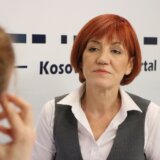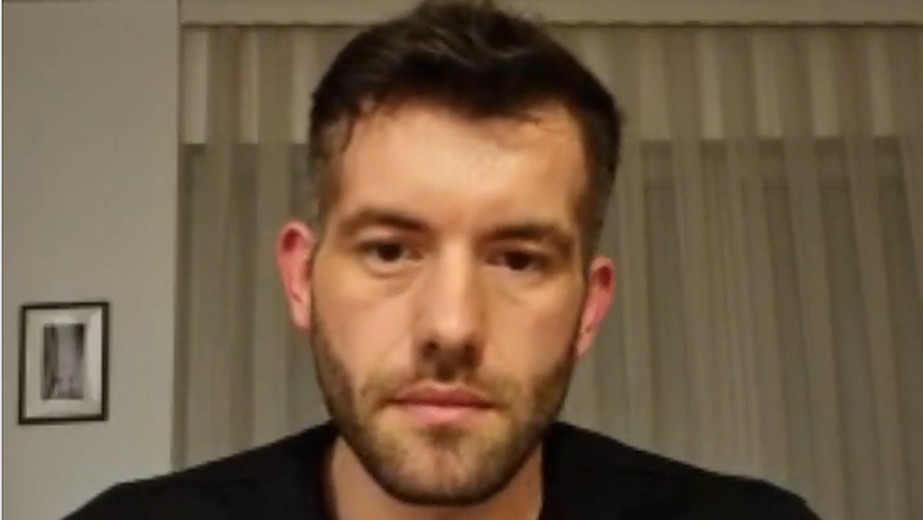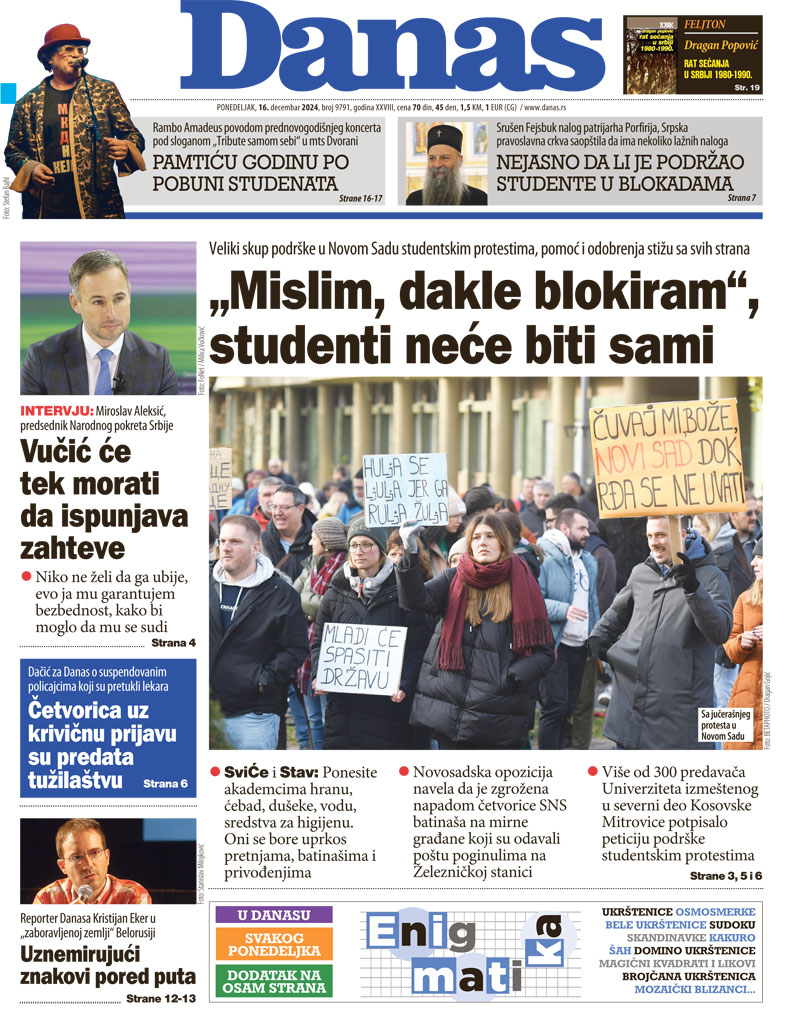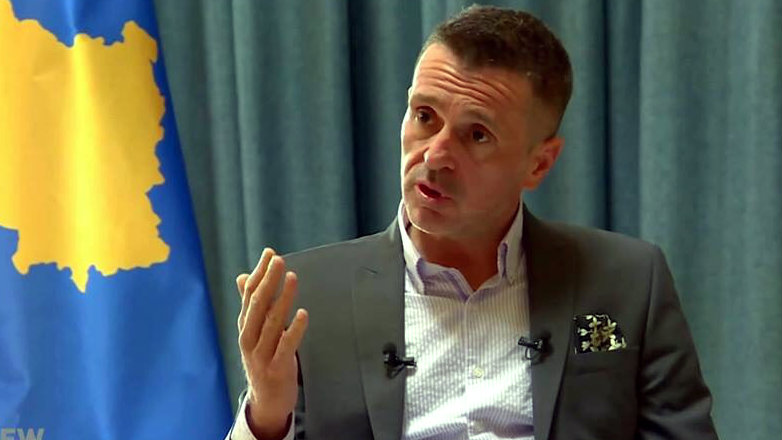 Foto: Facebook / Astrit Gashi
Foto: Facebook / Astrit GashiNije lako da se sve zaboravi za jedan trenutak, ali takođe ne sme da bude nikakvih prepreka da kao susedi živimo u miru i dobro jednim sa drugima, možda i bolje nego što smo znali nekada.
To poručuje Astrit Gaši, dugogodišnji urednik i novinar iz Prištine, koji odgovara na pitanja čitalaca našeg portala, kao i kolega iz Srbije, u okviru projekta portala Danasa “Druga strana Kosova”.
Šta bi, prema Vašem mišljenju, trebalo najpre i prioritetno učiniti kako bi se odnosi Srbije i Kosova normalizovali?
– Pre svega međusobno priznanje, kao i sve što dolazi posle toga.
Kako ocenjujete proces normalizacije koji trenutno vode vlasti u Prištini i Beogradu?
– Ocenjujem ga kao nenormalan, kao “normalizaciju preko nenormalizacije”. Zbog toga je i EU takav dijalog proglasila neuspešnim i zahtevaju da započne novi. Nešto se i dogodilo, neki sporazumi su uspostavljeni, tako da ja mislim da i mi i vi sada živimo normalnije. Šta vi mislite?
Da li je moguće da normalizaciju odnosa Kosova i Srbije okončaju političke elite koje su bile aktivne tokom sukoba devedesetih godina?
– Zapad misli da mogu. Isto to misle i građani u naše dve zemlje koji su glasali. To što mi mislimo, oni više nemaju vremena da slušaju.
Postoji li na Kosovu pritisak na nezavisne medije i u čemu se on ogleda?
– Postoji mali pritisak, najviše ekonomski i u svrhu unutrašnje političke bitke, ali volim da mislim da mi ipak stojimo bolje nego sve susedne zemlje.
Koga od srpskih kolega novinara posebno cenite?
– Znam lično mnogo srpskih kolega. Ne bi sada hteo da izdvojim nekog, to nije moj stil.
- Pitanja novinara i urednika BIRN Slobodana Georgieva:
Kada ste poslednji put bili u Beogradu i kako ste se ovde osećali?
– Ne znam, prošlo je 20 godina. Istine radi, nisam siguran da bih se tamo osećao dobrodošlim – i to mi smeta, pa možda zato nisam ni dolazio. To je predrasuda, naravno, i voleo bih da je samo o tome reč.
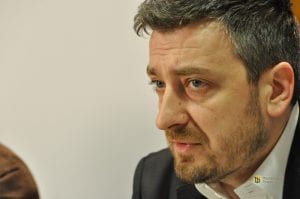
Da li možete da zamislite situaciju da Kosovo ne bude „nezavisno od Srbije“, ako imamo u vidu da je razlog pobune nesrpskog stanovništva bio režim koji je ugnjetavao Albance?
– Naravno da ne. Nije lako da se sve zaboravi za jedan trenutak. Ali takođe ne sme da bude nikakvih prepreka da kao susedi živimo u miru i dobro jednim sa drugima. Možda i bolje nego što smo znali nekada.
Kako ocenjujete položaj Srba na Kosovu i šta treba vlast u Prištini da uradi da se Srbi bolje uklope u kosovsko društvo?
– Srbi na Kosovu zapravo ne koriste sve što im naš Ustav garantuje. Kada bi se malo manje bavili politikom, i ako bi se manje vodili politikom iz Srbije, živeli bi i bolje. Mislim da na Kosovu ima više volje da Srbi žive bolje nego kod samih Srba koji žive u Srbiji. Naravno, nije sve učinjeno od strane Prištine, ali je još manje traženo, u građanskom smislu, od naših sugrađana Srba.
Kakav je vaš odnos prema zločinima koje je počinila OVK (UČK) tokom sukoba na Kosovu?
– Svi zločini treba da budu rešeni, sa svake strane. Rat na Kosovu je bio samoodbrambeni i oslobodilački. Ne možemo da zaboravimo da se ovde desila krvava agresija koju su počinile srpska policija i vojska, najviše nad nedužnim ljudima. Istinu svi treba da znaju, i na Kosovu i u Srbiji, i treba da se oslobodimo od “grobova rata”.
Šta je ono što bi moglo da suštinski dovede do pomirenja između Kosova i Srbije?
– Da jedni druge prihvatimo kao komšije.
- Pitanja čitalaca sa društvenih mreža:
Koliko su mediji zaslužni za tenzije na relaciji Priština – Beograd?
– Mediji imaju zasluge, ali više oni u Srbiji nego na Kosovu. Ovde smo, možda zbog toga što je novinarstvo u povoju, imali više nadzora iz inostranih zemlja. Više se obraćala pažnja na to kako se piše o Srbima koji ovde žive. U Srbiji može da se čita o “šiptarima”, a na Kosovu samo u izolovanim slučajevima, ili nikad o “škijama”.
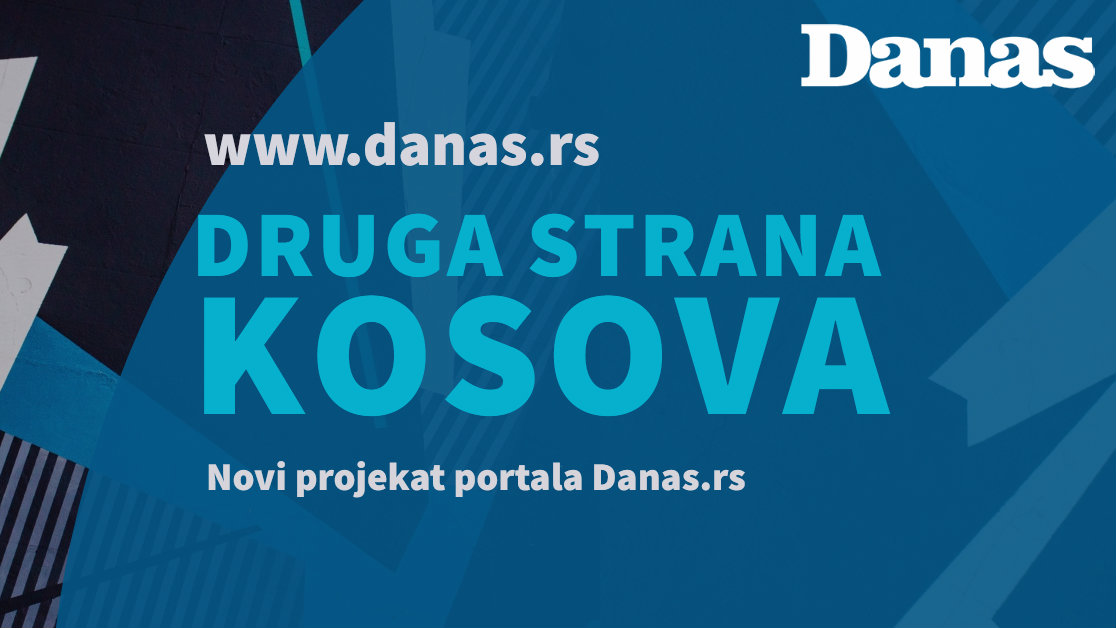
Kako živi običan, normalan čovek na Kosovu sa iole pristojnom platom, a da ne mora da uzima kredit?
– Ovde su gotovo svi u bankarskim kreditima. Ovo je veoma potrošačka ekonomija – ljudi troše više nego što zarađuju, a žive ne kao Evropljani, ali kao susedi. Neko bolje, neko lošije. Zapravo, nikad se nije bolje živelo na Kosovu, iako mi priželjkujemo još veći napredak.
Da li je tačno da je u poslednjih godinu dana trend odliva mladih ljudi sa Kosova u zemlje EU u porastu?
– Taj trend nikada nije ni prestajao. Mladi ljudi se više ne vežu samo za zemlju, već pre svega za sopstvenu dobrobit, zbog čega boljitak traže u Evropi. Mi nismo Evropa, niti smo još uvek blizu nje, ali tamo želimo ići.
Prema Vašem mišljenju, kada će Priština ukinuti carine od 100 odsto na robu iz Srbije?
– Srbija treba u nečemu da popusti da bi taksa bila ukinuta. Taksa ne treba ni Srbiji. Pritisak SAD na našu vladu je veliki, ali ostaje da vidimo kakav će biti konsenzus na kraju.
Koji postupak Beograda bi bio dovoljan da se to dogodi?
– Pre svega da se svi sporazumi iz Brisela implementiraju, kao i da se obustavi žestoka diplomatska akcija protiv Kosova. Takođe, potrebno je makar i privremeno dati šansu dijalogu. Niko ništa od toga ne bi izgubio.
ENGLISH VERSION
Astrit Gashi, an editor and journalist from Pristina, in the interview within Danas online project „Other Side of Kosovo“
I do not know if I would feel welcome in Belgrade and that is what bothers me
It is not easy to instantly forget everything. But on the other hand there must not be any obstacles to our living in peace and getting along well as neighbours, maybe even better than we once used to, Astrit Gashi, a long-time editor and journalist from Pristina, says, answering the questions of the followers of our portal and the colleagues from Serbia within Danas’ online project „Other Side of Kosovo“.
In your opinion, what should be the priorities for the sake of the normalization of relations between Serbia and Kosovo?
– Mutual recognition first and foremost and everything that follows it.
What do you think about the process of normalization that is currently being led by the authorities in Pristina and Belgrade?
– I think that it is abnormal, it is „normalization through abnormalization“. That is the reason why the EU declared that dialogue unsuccessful and they demand the new one to be opened. There are some achievements, some agreements have been reached, so, in my opinion, and we and you live more normal now. What do you think about it?
Is it possible that the normalization of relations between Kosovo and Serbia might be achieved by the political elites that were active during the 1990s conflicts?
– The West thinks that they can do it. And citizens who voted in our two countries think the same. They no longer have time to listen to what we think.
Is there any pressure on the independent media in Kosovo and how does it look like?
– There is weak pressure that is mainly financial and for the purpose of the internal political struggle, but I like to think that our situation is, nonetheless, better than the situation in all neighbouring countries.
Whom do you appreciate most among Serbian colleagues-journalists?
– I personally know many Serbian colleagues. I wouldn’t like to single anyone out, it’s not my style.
Questions of Slobodan Georgiev, a journalist and editor in BIRN:
When were you last time in Belgrade and how did you feel here?
– I don’t know, 20 years passed. Honestly, I am not sure I would feel welcome there and that is what bothers me and it might be the reason why I didn’t come there. Of course, it is a prejudice and I wish there was nothing beyond it.
Can you imagine the situation where Kosovo is not „independent from Serbia“ if we bear in mind that the reason for the rebellion among non-serbian citizens was the regime that oppressed Albanians?
– Of course I can’t. It is not easy to instantly forget everything. But on the other hand there must not be any obstacles to our living in peace and getting along well as neighbours, maybe even better than we once used to.
What is your opinion on the position of Serbs in Kosovo and what should the authorities in Pristina do in order for Serbs to be more integrated into Kosovo society?
– Serbs in Kosovo actually do not use everything that is guaranteed them by our constitution. If they were less interested in politics and if they were less guided by the politics from Serbia, they would live better life. I think that there is more willingness in Kosovo to enable Serbs to live better life than among Serbs themselves who live in Serbia. Of course, the authorities in Pristina did not do everything in its power, but on the other hand, even less demands regarding civil rights were made by our Serbian fellow-citizens.
What is your opinion on the crimes committed by the Kosovo Liberation Army (KLA/UCK) during the conflicts in Kosovo?
– All crimes committed by all sides should be solved. The war in Kosovo was fought in self-defence and it was a war of national liberation. We cannot forget that the crime of bloody aggression mainly against innocent people was committed here by Serbian police and military. The truth should be known both in Kosovo and Serbia and we should free ourselves from „the war graves“.
What can fundamentally bring reconciliation between Kosovo and Serbia?
– We should accept each other as neighbours.
- Questions of the social media followers:
To what degree are the media responsible for the tensions between Pristina and Belgrade?
– The media bear the responsibility for it, but more responsibility fall on the media in Serbia than on the media in Kosovo. We have been under stricter supervision of the foreign countries which might be the result of the fact that our journalism is still in its infancy. More attention has been paid to the ways of writing about Serbs who live here. One can read about „siptars“ in Serbia and in Kosovo one can never read about „skijas“ or can read about them only in the isolated cases.
How does an ordinary, average citizen earning a decent salary live in Kosovo without having to get a bank credit?
– Almost all citizens here have bank credits. This is mainly a consumption economy – people spend more than they earn and they do not live like Europeans, but like their neighbours. Some of them better and some of them worse. Actually, life in Kosovo has never been better although we hope for still greater improvement.
Is it true that there was a growing trend in the outflow of Kosovo young people to the EU contries within a year?
– That trend has never ceased. Young people no longer develop attachment only to a country, but they are primarily guided by their own wellbeing, which is the reason why they look for better life in Europe. We are not Europe and we are still not close to it either, but that is where we would like to go.
In your opinion, when will Pristina abolish a tariff of 100 % on Serbian goods?
– Serbia should yield to some things in order for the tariff to be abolished. The US puts great pressure on our government, but it remains to be seen what consensus will be reached in the end.
Which action should Belgrade take in order to make it happen?
– Above all else, all Brussels agreements should be implemented and severe diplomatic action against Kosovo should be stopped. In addition to it, the dialogue should be given a chance, at least temporarily. No one would lose anything due to it.
Pratite nas na našoj Facebook i Instagram stranici, ali i na X nalogu. Pretplatite se na PDF izdanje lista Danas.


